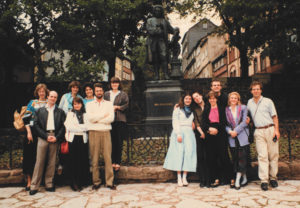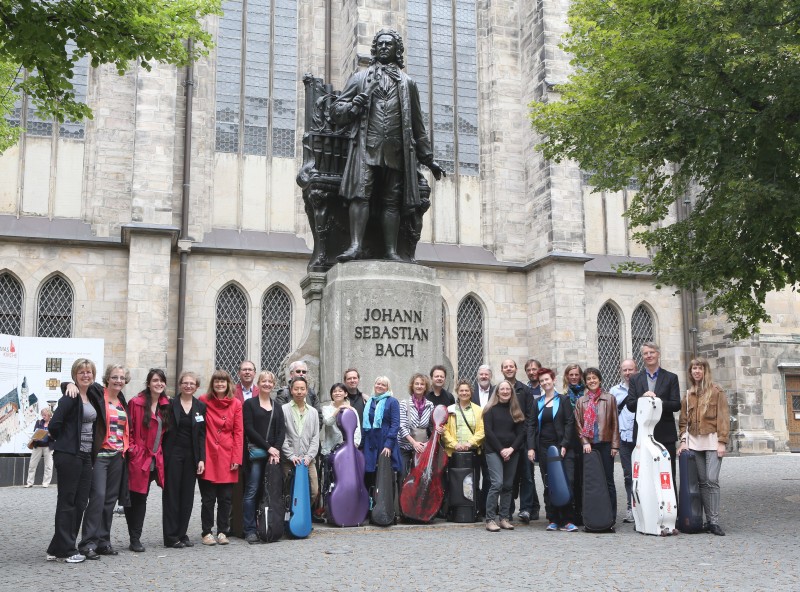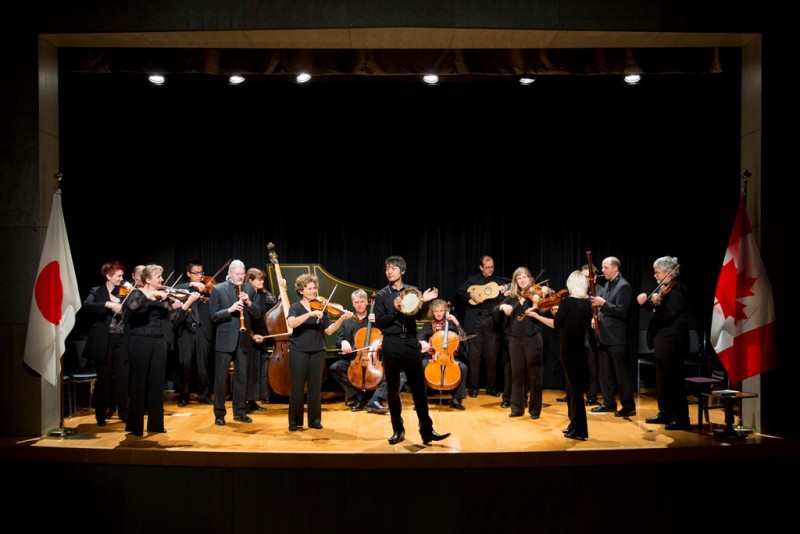Our next concert, On the Road, pays homage to Tafelmusik’s history of tour and travel. Bringing our concerts around the world is part of our organization’s legacy—and, something we’re greatly missing at this time.
In advance of this concert, we asked our musicians to share with us some of their fondest memories—and, some of their scariest hiccups!—while traveling around the world with our orchestra. Here are their stories.
Members of Tafelmusik in front of the Bach statue in Eisenach, during a tour of former East Germany, in spring 1987.
Charlotte Nediger, harpsichord
My strongest memories of touring are of a performance at the Odeon of Hordes Atticus in Athens in 1997, and our tour of East Germany in 1987. The Odeon is an ancient stone amphitheatre built into the side of the hill leading to the Acropolis, built in 161 AD and restored (without its original cedar roof) in the 1950s. Our concert took place on a clear moonlit night, and the sense of history was overwhelming: our “early” music felt very modern in this context. The East German tour was a chance to experience a much more recent history. Entering the country by train, somehow the world around us shifted from colour to black-and-white. It was remarkably powerful to share music with audiences who had learned to show little expression in their faces, but who listened with an intensity that was palpable to an extent that I hadn’t experienced before, nor have I experienced since. It was clear that hearing live music was a lifeline, so much more than an evening’s entertainment.
Tafelmusik rehearsing at the Odeon of Herodes Atticus amphitheatre at the base of the Acropolis in Athens.
Marco Cera, oboe
My strongest memory of touring is of a particularly hot summer in the ancient town of Rieti, central Italy, near Rome. Tafelmusik performed at the Teatro Flavio Vespasiano, the city’s theatre and opera house, built in the late 19th century. We played music from Italian operas, which was very appropriate for the location. The absence of air conditioning in the theatre contributed to giving both us and the audience a full historical, authentic experience. It was great to be able to share the history, traditions, art, and food of my country with my Canadian colleagues!
Julia Wedman, violin
I feel incredibly blessed to have joined Tafelmusik when I did. I have so many unforgettable memories, from my first Asia tour where I was so jet-lagged that I thought I couldn’t play the concert (“Just go off stage if you need to throw up during your concerto,” advised Jeanne Lamon); to idyllic summers in Germany at our beloved Klang und Raum festival in the “haunted monastery”; to beautiful pre-concert walks in the botanical gardens of Australia.
But one of the most enlightening experiences happened a few concerts into my first Japan tour. After the performance, I was frustrated and sad: the audiences were so quiet that I felt like we were not deeply connecting with them—and, we were playing our memorized The Galileo Project program! A sure win! We trade off on press duties, and it was my turn to sign CDs after the Kyoto concert. To my shock and delight, there was an enormous line-up waiting for us, full of fans who could not wait to talk to us in vivid detail about how what they loved about our performance! I will never forget a pregnant woman who was completely overwhelmed by the concert, her first experience with baroque music. She was giddy with excitement and wanted to talk to us about so many things that her husband literally had to drag her away! I remember thinking, that little baby’s life just changed that day. It was a dramatic reminder that every audience is different, and we never know whose lives we will touch with our music.
The Orchestra posing with the statue of Bach at St. Thomas Church, Leipzig, June 2014.
Keiran Campbell, violoncello
In early fall of 2019, I was lucky to be part of a recording session and tour of Europe with Jordi Savall and Le Concert des Nations. The tour started with a week of recording Beethoven Symphonies 1, 4, and 5, in a castle built in 886 by Wilfred the Hairy. We lived in the castle itself during the recording process, which made the fact that the sessions usually took place from 5pm to around 12 or 1am a little less painful. These sessions were followed by massive dinners, and they were capped off with a dizzying amount of wine, which may or may not have been the reason that our days started so late…
After the sessions were finished, we set off on the tour, which took us to Italy, France, Germany, and back to Spain. Along the way, we had a few afternoons off, which is one of my favourite things about touring: I absolutely love being able to wander around a city that is often brand new to me, knowing that I will likely be in a completely different country the next day. In various cities in Italy, I compared a lot of gelato (Ferrara was the clear winner); in Paris I had escargot for the first time (very good); in Frankfurt I met up with an old cellist friend; and in Barcelona I went to breakfast at La Xampanyeria, which serves bocadillos (which I can only describe as the most incredible version of a bodega breakfast sandwich) paired with Cava. All of this, together with the experience of playing Beethoven Symphonies under the baton of one of my musical heroes, was wonderful.
Lucas Harris, theorbo
In 1605, Queen Elizabeth I’s architect Inigo Jones brought the first theorbo to England from Italy. When he went through customs at Dover, the theorbo was confiscated by officials who suspected it was an instrument of war brought over from a “popish” country to harm the Protestant queen. It would seem that traveling with a theorbo had its difficulties even four centuries ago!
My least favourite touring moment of all time: the day Tafelmusik arrived in Madrid, Spain, and had a concert that evening in the Royal Palace of Aranjuez. I was excited about playing a concert in the place which inspired Joachim Rodrigo’s Concierto de Aranjuez for guitar and orchestra, which I’d played once with my college orchestra. We were at the airport waiting for our baggage to arrive, and when my theorbo came out I knew immediately something was wrong since one end of the case was bashed in.
I was sweating with a racing heart as I opened the case to find my theorbo’s belly ripped off the bowl after the bottom of the lute suffered an impact of some kind. Probably it was dropped, or maybe had a suitcase jammed into it. (And by bad luck, this was the one flight where I hadn’t detuned the strings since we had a concert a few hours after landing, not enough time for the tuning to re-stabilize. So the string tension folded the detached belly in on itself.) That night in Aranjuez, I could make no bigger contribution to the concert than flailing on a drum in a couple of pieces. Thankfully—through the international network of lutenists—I managed to find a baroque guitar to borrow for the tour’s final concert in Lisbon, where the instrument’s generous owner proudly listened in the audience. Once we made it home, it took the better part of a year to have a new belly made and installed on the theorbo. The carved rosette from the smashed soundboard survived, and was cut out and transferred to the new one, which saved the luthier Michael Schreiner a few days of carving work (this is why the rosette has a slightly darker colour than the rest of the belly). Since the structure of the instrument’s case was now compromised, I had to order a new custom molded fiberglass flight case from the Czech Republic.
Since this incident, I have rarely trusted my instruments again to baggage handlers!
Brandon Chui, viola
My very first Tafelmusik tour was in November 2013, with a trip to Japan and Korea. Tokyo is famous for its complex subway system, a network which confuses even the locals. After a morning of sightseeing, fellow violist Patrick Jordan and I were in a hurry to get back to our hotel to prepare for the evening’s concert.
It was around 3pm, and Tokyo rush hour was well underway. Our train out to the area of Chofu (where our hotel was) was waiting at Shinjuku station. We noticed some of the overcrowding that Toyko’s subways are famous for, so we walked farther down the platform looking for some empty space. To our pleasant surprise, there was a car farther down with more than ample room so we casually walked on. As we waited just inside the doors for the train to disembark, a transit official approached us from the platform and started speaking to me in Japanese — that makes sense, I’m the Asian guy! But I’m Chinese, and have no clue what he’s trying to tell us. I gestured to myself and Pat, saying, “Chofu! Chofu station!” I thought he understood because he nodded and walked away.
Quite satisfied with my fantastic communication skills, I started looking around the train. “Wow,” I thought to myself, “there are a lot of women in this train. Wait a sec, I think Pat and I are the only…” and right at the moment, a woman jabs me in the arm and points to the sign: “WOMEN ONLY.” Because of the overcrowding—and very unfortunately, due to the assaults which happen amongst the overcrowding—the Tokyo subway has set up designated women-only spaces, so that female commuters can travel safely. Thanks to the woman civilian who kicked the two dumbos off: she was far more effective than the transit official, all without words!
The Orchestra with Japanese narrator Seiji Fukushi at the Canadian Embassy in Japan, 2013. Credit: Embassy of Canada.
Geneviève Gilardeau, violin
I had not travelled much when I first joined Tafelmusik in 1998, and I loved it all. Every moment was covered in an aura of magic and freedom. Baroque music had been my dream, and now this music—alive, fresh—was carrying me over oceans and continents. I was in awe—and also very intimidated to share the stages, the busses, and the airplanes with such incredible musicians.
But as I reach for the moments from which the colours have not faded, I find moments like this one:
I have been walking and discovering a small Japanese city. I am happy, tired, hungry. Beauty is everywhere, and after getting a bit lost, I find a very small restaurant. I don’t speak the language, and I have no idea what I am ordering. I sit in the sun at the only table outside, and eat the wonderful soup that was hiding behind the symbols I didn’t understand.
It is moments like this one that still ring true: the kindness of strangers, the music in my head, the cafe tables where I gathered my thoughts and rested my tired jet-lagged body. Often, colleagues from the orchestra appeared in those moments. We exchanged what our couple of hours of free time had brought before getting back to the reality of suitcases, busses, getting ready for the next concert, practicing that impossible passage in Haydn, Rameau, C.P.E. Bach, Locatelli…
Sometimes tours brought us to my family in Montréal. I felt proud and happy. This year my family heard all our concerts in our virtual concert hall. It’s a different kind of magic, which made the distance disappear for an instant.
I have toured less since my daughter was born 9 years ago, though she’s done many tours with us. As she is growing up, I hope to take her along again.




